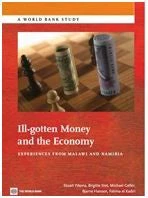
In a study conducted between November 2010 and February 2011 on ill-gotten money and the economy, the Financial Integrity team looked at the experiences of Malawi and Namibia. We approached the project with an open mind and without any assumptions, finding that for Malawi, corruption and tax evasion as a percentage of GDP represent a significant drag on economic development. Corruption is estimated at 5% of GDP and tax evasion, at a whopping 8-12% of GDP. Meanwhile, we estimated that tax revenue actually collected by the Malawi Revenue Authority is only 22% of GDP. Thus, if the national tax authority had successfully collected all the taxes it was due, government revenue would increase by 50 percent. This is approximately about how much Malawi receives in foreign aid (11.7 percent of GDP). As one Malawi Revenue official stated when being interviewed during the study: “if we collected all the taxes, we will then not have to depend on foreign aid”.
The Namibian tax evasion situation is no better, as uncollected taxes are equivalent to about 9% of the GDP. This is larger than education’s share of the economy and almost as large as the mining sector—which generates most of the country’s export income. What makes things worse is that Namibia suffers from the highest income inequality in the world: The Gini co-efficient, which measures the gap between rich and poor, is estimated at 70.7. Tax evasion siphons away money that could be invested in productive resources needed to diversify the economy and address urgent social problems.
Furthermore, the revenue lost through corruption and tax evasion represents a diversion (“leakage”) of financial resources away from the national budget toward private spending. And these private expenses or expenditures have much lower “multiplier effects” than expenditures on, for example, agricultural fertilizers, education, health, and infrastructure.

1. Losses caused by corruption and tax evasion are powerful examples of how criminal activities can potentially have tremendous negative effects on economic development.
2. Ill-gotten money is not spent on productive investments that can have a multiplier effect on an economy and benefit the significant majority of a population, rather than just a select few.
3. Policymakers in governments and development institutions such as the World Bank cannot afford to ignore issues that stand in the way of achieving economic progress, because it means that many people remain in poverty. So, in the case of Malawi and Namibia, addressing corruption and tax evasion should be part of a continuing dialogue with the two governments in our engagement with policymakers.
4. The study confirms the importance for developing countries to adopt, for their own benefit, customized legal regimes and institutions to go after dirty money. The regimes should reflect local political, economic and social contexts.
As practitioners, addressing these crucial issues head on – be it corruption, tax evasion or a bloated public sector—is our responsibility. No matter how contentious or uncomfortable it may be, we should avoid ignoring this “elephant in the room” and not look the other way when we know that any of these big issues are affecting a client country. We should explore initiatives that target the root of the problem—helping governments implement solutions to critical problems like tax evasion in the short-term, and exploring behavior-changing programs by educating youth on the perils of corruption in the longer term. We hope that policy makers will take our findings into account and do the same.


Join the Conversation